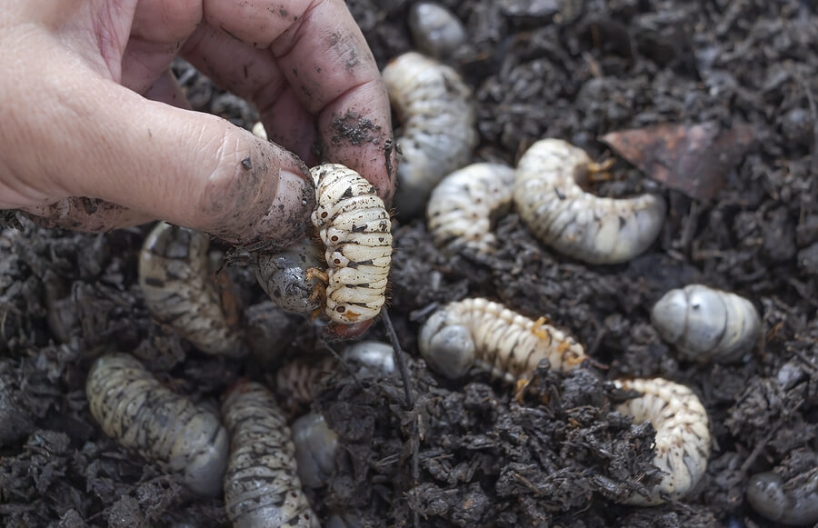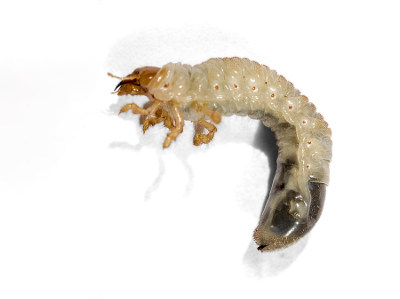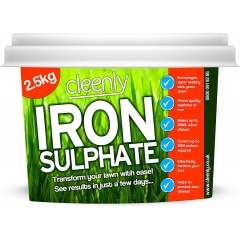
February 23rd, 2021 by
While gorgeous blooms tend to get all the glory, all gardeners know that the key to a beautiful garden is a lush, green lawn. There’s little pretty planting can do to rescue a garden with patchy, yellow grass.
If you value your manicured lawn, then your greatest garden enemy is the chafer grub. These pests attack your grass from the root, offering it no chance of recovery and what’s worse is, once an infestation has taken hold, they are really hard to eradicate.
What are chafer grubs and why should gardeners fear them?
 Chafer beetles are harmless however their grubs are not. The beetles lay their eggs in the grass and the grubs hatch and live underground. They feed on grass roots so living under your lawn in this way gives them uninhibited access to all the food they need. As you can imagine, damaged roots eventually result in damaged grass but of course, by the time you notice the damage, the infestation is often well established.
Chafer beetles are harmless however their grubs are not. The beetles lay their eggs in the grass and the grubs hatch and live underground. They feed on grass roots so living under your lawn in this way gives them uninhibited access to all the food they need. As you can imagine, damaged roots eventually result in damaged grass but of course, by the time you notice the damage, the infestation is often well established.
Not only can they devastate a lawn with their feeding; they are a desirable food source for birds, hedgehogs, foxes, and badgers which may seem like a good thing for wildlife but could see your lawn being torn up by these animals to get to them.
OK, they are bad news for lawns, but you can get rid of them, right?
This is where chafer grubs complete their hat trick of horror. As well as being super destructive and hard to identify until they’ve already done the damage, they are also very difficult to remove. This is because there are no pesticides available that will effectively kill them.
There are a couple of possible solutions, but both come with major drawbacks: neem oil would kill the chafer grubs, but also bees and ladybirds (which you really don’t want to kill), and nematode parasites will kill chafer grubs and leave other insects and plants alone but are very expensive due to the quantity needed to treat a large area such as a lawn.
Focus on prevention, rather than cure
Cleenly 2.5KG Iron Sulphate
Price: £13.96
Buy Now
If there was ever a reason to be proactive in your lawn care, it is this. It is very possible to defend against chafer grubs. Taking measures to prevent them from living in your grass means you never have to deal with the damage nor contend with all the issues around trying to get rid of them.
Here is the good news: unlike the strategies for removing them, there are no downsides to the best course of prevention – in fact, there are multiple benefits.
That’s because the greatest weapon in your chafer grub prevention arsenal is iron sulphate – a low-cost lawn treatment that is commonly used as a grass greening solution. There are a number of reasons why iron sulphate is such a powerful protector of grass:
It strengthens it and makes it healthier
Stronger, healthier grass is more resistant to all pests, including chafer grubs. It means that even if you get a few, the grass is strong enough to minimise any damage as well as ward off a significant infestation
It increases acidity
Iron sulphate works by increasing the acidity in the soil and the grass, which chafer grubs don’t like. They are much less likely, therefore, to want to make their home there
It’s part of good grass maintenance
Applying iron sulphate just makes common sense as part of your usual grass maintenance routine because of all the good things it does. As well as resist pests, your grass will be greener, lusher, and stronger. It’s also very effective at keeping weeds and unwanted growths at bay, such as moss
It’s inexpensive and easy to apply
Both of which make it an infinitely better prospect than having to deal with the fallout of an infestation.
While every gardener will benefit from using iron sulphate on their grass, it’s particularly advisable if you see signs of damage on other lawns nearby. A chafer grub infestation in your neighbours’ lawns could see yours being targeted next as they exhaust their food supply and seek juicy grass roots elsewhere. Iron sulphate can be applied in any season and should be repeated periodically all year round.
Comments
Leave a reply
Your e-mail address will not be published. All fields are required


